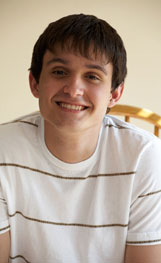Michael Grelle

“I see courage every day”
Michael Grelle’s basketball team, the St. Louis Junior Rolling Rams, qualified for its national championship tournament in Seattle last winter. The Rams came home ranked 14th in the country.
One of the fans in attendance was Louisa (Lou) Salvin, R.N., a clinical nurse in pediatric urology who has cared for several of the team’s players at SSM Cardinal Glennon Children’s Medical Center.
“I have relatives in Seattle,” she said. “When I found out the team would be playing there, my husband and I moved up our visit so we could attend. I brought my family members to the games. It was very inspiring for them and wonderful for me. Michael is one of the older players on the team and, in a lot of ways, he is a role model for the younger kids.
“He is kind, bright, articulate and has a great sense of humor, and is a team player in everything that he does.”
Michael has been a patient at Cardinal Glennon since he was born with spina bifida, a birth defect resulting from incorrect formation of the spinal cord during fetal development. The defect results in varying degrees of leg paralysis and limitations of bowel and bladder control.
In 2005 he underwent 10 hours of surgery at Glennon for two recently-developed procedures that vastly improved his ability to control and empty his bladder and bowel. The Monti procedure, named for the physician who invented it, creates a tube from the bladder to the belly button through which a patient uses a catheter to empty the bladder. With the ACE or MACE procedure (Malone antegrade colonic enema), a different catheterizable tube, often using the appendix, is created from the large bowel to a small opening in the abdomen. Using a catheter, the bowel is irrigated with a glycerine and saline solution while the patient sits on the toilet.
“Before these procedures, these kids come in diapers and can have poor self-esteem,” said Casimir F. Firlit, M.D., a urologic surgeon at Glennon. “Afterwards they feel very good about themselves because they have control. They don’t need mom and dad to help them because they can handle things themselves.”
“I definitely have more independence,” said Michael, who has discussed the procedures with members of his basketball team. Three have decided to undergo the procedures. “What they were doing before wasn’t working and they were looking for something to make life easier,” he said.
Michael soon will begin his senior year at Mehlville High School and is looking toward college, where he plans to study speech and communications or web site design. “I might like to become a radio disk jockey,” he said. “I am really good at telling you about music. My dad’s music – classic rock – is my music.”“Music is Michael’s second love,” said his mother, Donna. “He can tell you who wrote the songs, what the words are and why they wrote it.”
He also hopes to attend a college that has a wheelchair basketball team so he can continue his athletic career.
“Basketball is another way for me to get out, stay active, be healthy and meet new people,” Michael said. “I want to have an experience as close as possible to being an able-bodied person playing sports. We are out there having fun. We feel like we are normal. ”
Wheelchair basketball, particularly at a highly competitive level, allows the players to feel normal, Donna said. “They think about playing basketball. They don’t think about playing basketball in a wheelchair. That is one place they feel camaraderie. There is so much athleticism they can achieve, and it does so much for their self-esteem. The level of play at the tournament was amazing.”
She also was amazed that Lou Salvin traveled to Seattle to watch some of her “Glennon Kids” compete.“Lou went to our tournament in Seattle and brought her family to watch. That shows you how tight we are,” said Michael, “She is like family. We love her.”
“I really like seeing the kids out of the hospital and see them interacting as teenagers,” Salvin said. “You see them as able-bodied because they are so incredibly functional. The wheelchair team is rough and tough. They are going to grab that ball from you. They are going to ram your wheelchair. I just love these kids. I see courage every day.”